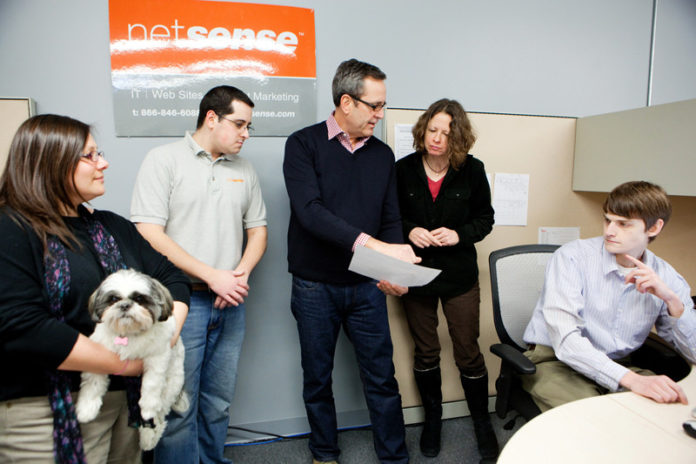
Think of the last time you needed to buy something – a cellphone, a laptop or camera. Did you Google it? Probably. What about that restaurant you pass by on your way to work? Did you look at its Yelp! reviews before making reservations?
And when you needed a new doctor? Chances are you at least skimmed the search results.
In 2011, the average shopper used 10.4 sources of information before buying, according to zeromomentoftruth.com.
“Word of mouth has been around forever, but for the first time in history, there’s a digital archive of what’s been said,” said Ed Kedzierski, Internet-marketing consultant for Cranston-based IT services company netsense.
What does this mean for small to medium-sized businesses? They need to start investing in monitoring their online reputation.
This new market has created opportunities for public-relations professionals as well as technology businesses who can offer a new service to their clients.
At least two local firms have launched online-reputation-management services (ORM), netsense and Brave River Solutions.
“As soon as you talk about online-reputation management, people realize it’s a need – just like they realize public relations is a need. I think it’ll be a great extension for existing clients and for new clients,” said Brave River President Ernie Gaines. The firm launched its Driven Internet Marketing division in October, which encompasses its ORM services.
Netsense has its feet a little wetter, launching its Netcast service just over a year ago.
Kedzierski explains that they’ve taken a “holistic approach [to ORM]. It’s not just the review sites; it’s not just Facebook; it’s not just Twitter. It’s everything combined working together.
“Google calls it the zero moment of truth. The first moment of truth is when they decide to buy something; second is their experience with that service or product. The zero moment of truth is when people are doing all of their research before they decide what to buy,” Kedzierski said.
Brave River takes a three-pronged approach to its ORM service: “We monitor, promote and protect.”
Monitor – using back-end tools to watch Facebook, Twitter, Google, etc., for mentions of your company; promote – using SEO and other techniques to make sure that you pop up on search results; and protect.
Locally, one example of that would be the florists ensnared in the recent Cranston prayer-banner controversy.
One of the florists, Twins Florists, was “getting extremely bad reviews [from] people [who hadn’t] used their service, and, all of sudden, they have to negatively think about their online reputation because they’re caught up in this whirlwind of a very divisive issue,” said social media specialist Chad Westleigh for Brave River.
“Sometimes when you’re just trying to stay on the sidelines, it can still be perceived as you taking a side. Because the Internet has given [the public] the ability to be influencers, it’s important to monitor and understand what your perception is online,” he said.
Prevention is always the best medicine, ORM professionals agree. It’s better to have a strategy in place, rather than trying to play catch-up when something goes viral.
Local restaurant owner Chris Tarro, who co-owns Siena Restaurants with his brother, Anthony, never thought checking Yelp, Trip Advisor and Google Places would be part of his weekly workload five years ago.
“I don’t know how anybody can avoid what’s on the Web. How obsolete is the phonebook becoming? Even if they’re just looking up your phone number, some of [the review] websites are going to come up,” Tarro said.
Tarro responds to all of the reviews, good or bad.
“People are surprised that management would take the time to reply to every review. I think it shows that we’re concerned about our customers, their input and the experience we deliver,” he said.
Tarro has had that “negative ORM” situation to deal with. One customer, unhappy with her meal, posted bad reviews to all four of the sites Tarro checks.
“If you come here and don’t enjoy the experience, we feel bad. [But] at some point you can’t please all the people, all the time. Sometimes we can agree to respectfully disagree,” he said.
Nevertheless, Tarro likes to look at the silver lining of the negative reviews.
“I would argue that if you can turn a bad situation into a good one, you’ve probably built a better relationship with your customer than with someone that liked it from Day One,” he said.
So what tactics do professional ORM services take when their client has a bad review? They “sink” the results on Google, creating positive content, so eventually the bad review doesn’t show up on the first pages.
“You look at what you’d like people to find – not at what people are finding. I use an awful lot of PR techniques. We work the blogs, press releases, white papers, and positive reviews by real customers,” said Susan D. Wagner, director of corporate communications of the MBA Team, which partners with a local firm, Rhode Island Web Design. Wagner, like other ORM professionals, staunchly opposes companies writing their own fake, “positive” reviews.
“It eventually becomes old news and the positive things are what remain,” she said, noting her agency also seriously vets its clients.
“We’re really careful to take clients we feel we can get behind, because it’s hard to work for somebody we don’t believe in,” she added.
But how do you find an ORM service? What qualifications do ORM professionals have?
Writing skills are essential, says Wagner, who has 30 years of professional writing experience.
That person/firm should also have strategic-planning skills, a solid Web team, a PR background, and should be available to you 24/7, she underlined, “because it takes a short time for something you don’t want to go viral – to go viral.”
And, despite that urge to stick your head in the ground when something goes wrong at your business – that’s the worst thing you can do, ORM professionals agree.
“There’s a saying – ‘stuff’ happens. Everyone understands that stuff happens. How a business responds is what people pay attention to,” said Kedzierski.
“I’m a firm believer that if you’re wrong – just apologize,” added Wagner. •












